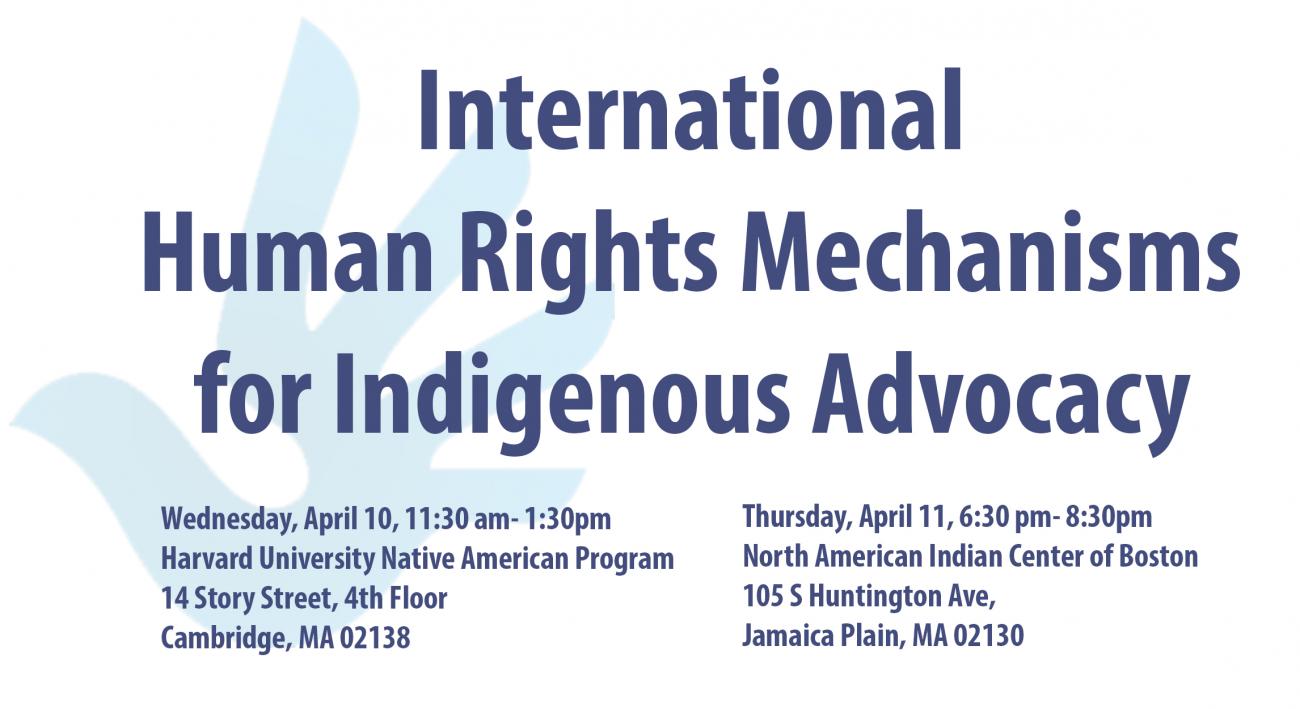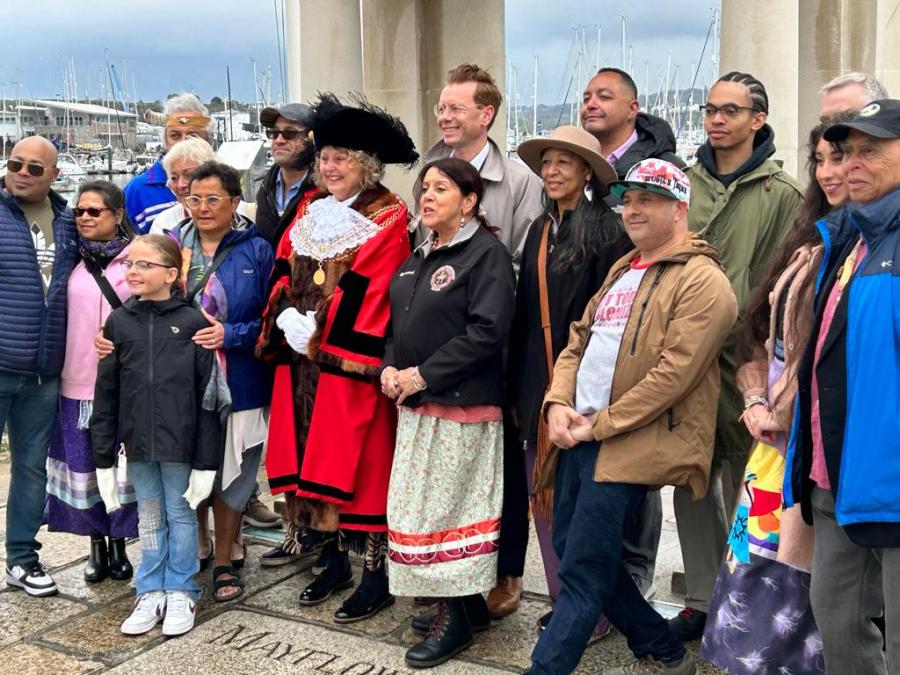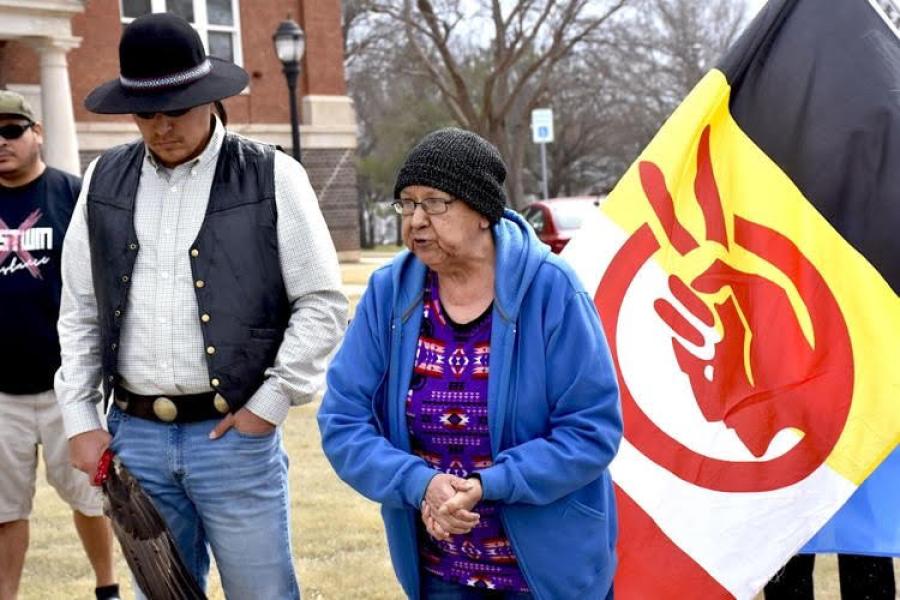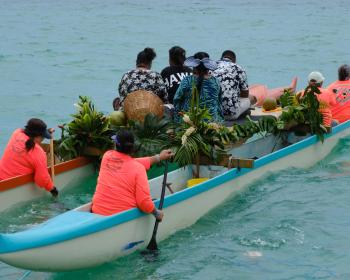
Come learn about international human rights mechanisms, including the UN Declaration on the Rights of Indigenous Peoples, the Universal Periodic Review (UPR), the World Conference on Indigenous Peoples Outcome Document, and how they can aid in your advocacy efforts and put pressure on the U.S. government, both locally and nationally, to respect Indigenous Peoples’ rights.
We invite Tribal members and community advocates in preparation for the United Nations Human Rights Council’s Third Universal Periodic Review of the United States in 2020.
Wednesday, April 10, 11:30 am- 1:30pm (Brown bag lunch)
Harvard University Native American Program
14 Story Street, 4th Floor
Cambridge, MA 02138
Thursday, April 11, 6:30 pm- 8:30pm
North American Indian Center of Boston
105 S Huntington Ave,
Jamaica Plain, MA 02130
The UPR is a process conducted at the United Nations in Geneva that reviews each UN member state’s record with regard to its human rights obligations and commitments. The United States’ record is scheduled to be reviewed in April-May 2020. Civil society is encouraged to submit stakeholder reports outlining the issues affecting their communities in regards to international human rights standards. (Deadline: October 3, 2019)
“The ultimate aspiration of the Universal Periodic Review is the improvement of human rights in every country with significant consequences for people around the globe. If Indigenous Peoples participate in each phase, there will be a rigorous review and the results will be substantive. It can become a regular measure of how states are implementing the rights enshrined in the UN Declaration on the Rights of Indigenous Peoples, and it can be the catalyst for the conversation with a country’s leadership to ensure the Declaration is beyond paper, building better lives for Indigenous Peoples.”
—Joshua Cooper is a professor at the University of Hawai’i, West O'ahu, Kapolei, director of the Hawai’i Institute for Human Rights, and the CEO of The GOOD Group.
Joshua will lead the training and guide Tribal members in preparing the 5 page stakeholder reports for submission to the Human Rights Council.
Please RSVP to agnes@cs.org by April 8. Space is limited.
· For additional information on the UN’s Universal Periodic Review Process, please visit:
- http://www.culturalsurvival.org/publications/cultural-survival-quarterly/universal-periodic-review-potent-process-realization-human
- http://www.state.gov/j/drl/upr/process/index.htm
- http://www.ohchr.org/en/hrbodies/upr/pages/uprmain.aspx
· For additional information about the U.S. government's first Universal Periodic Review, please visit this website: http://www.state.gov/j/drl/upr/.
UN Declaration on the Rights of Indigenous Peoples
https://www.culturalsurvival.org/undrip
World Conference on Indigenous Peoples Outcome Document
http://www.un.org/en/ga/search/view_doc.asp?symbol=A/69/L.1
We hope to see you.
This event is being organized by:
Cultural Survival, a global leader in the fight to protect Indigenous lands, languages, and cultures around the world. In partnership with Indigenous Peoples, Cultural Survival advocates for Indigenous communities whose rights, cultures, and dignity are under threat. For more information go to www.cs.org
International Network for Diplomacy & Indigenous Governance Engaging in Nonviolence Organizing for Understanding & Self-Determination (INDIGENOUS) is a monumental movement aspiring to change the centuries of making indigenous peoples invisible through colonization and to create a climate of inclusion in the family of nations in the 21st century. INDIGENOUS mobilizes for the realization of human rights of Indigenous Peoples in the seven recognized Indigenous regions in the world through community driven campaigns of direct-action and diplomacy.
Co-sponsored by:
Harvard University Native American Program
North American Indian Center of Boston
Massachusetts Center for Native American Awareness
http://www.mcnaa.org/
Institute for New England Native American Studies at the University of Massachusetts Boston
https://www.umb.edu/inenas
United American Indians of New England
www.uaine.org/
Suffolk University Law School’s Human Rights and Indigenous Peoples Clinic



